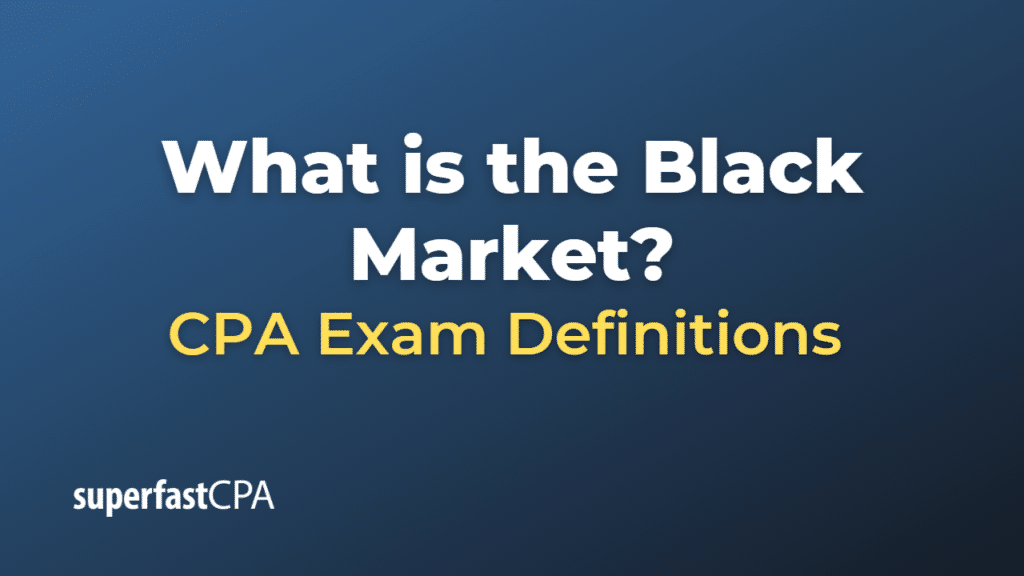Black Market
The black market, also known as the underground market, shadow economy, or informal economy, refers to the economic activities that involve the illegal trade of goods or services. These activities operate outside of government regulations, taxation, and official oversight. Black markets typically emerge when government restrictions, high taxes, or excessive regulations create demand for certain goods or services that cannot be met through legal channels.
Some common examples of goods and services traded on the black market include:
- Illicit drugs: The trade of illegal drugs, such as cocaine, heroin, and marijuana, is one of the most well-known black market activities.
- Counterfeit goods: The production and sale of counterfeit products, such as luxury handbags, watches, or electronics, which are designed to resemble genuine branded items but are typically of lower quality.
- Smuggled goods: The illegal import or export of goods to avoid taxes, tariffs, or import/export restrictions, such as smuggling alcohol, tobacco, or other restricted products across borders.
- Stolen goods: The trade of stolen items, such as cars, electronics, or jewelry, which are often sold at a fraction of their original value.
- Illegal arms trade: The trade of weapons and ammunition without proper licensing or in violation of national or international laws.
- Human trafficking: The illegal trade of human beings for the purpose of forced labor, sexual exploitation, or other forms of modern-day slavery.
- Unlicensed services: The provision of services, such as unlicensed medical or dental procedures, by individuals who do not have the necessary qualifications or legal authorization to perform them.
Black markets can have various negative consequences for society, including:
- Loss of tax revenue: Since black market transactions are not reported to the government, they do not generate tax revenue, which can lead to reduced funding for public services.
- Legal businesses’ competitiveness: Black market operators can often sell their goods or services at lower prices than legal businesses since they do not pay taxes or comply with regulations, making it difficult for legitimate businesses to compete.
- Public health and safety risks: Illegal goods or services may be of lower quality or pose risks to consumers due to the lack of regulatory oversight and quality control.
- Crime and violence: Black market activities are often associated with organized crime, which can lead to increased levels of violence and other criminal activities within communities.
Governments around the world attempt to combat black markets through various measures, such as law enforcement efforts, public awareness campaigns, and regulatory reforms to reduce the incentives for engaging in illegal trade.
Example of the Black Market
Let’s consider a hypothetical example of a black market operation involving the trade of counterfeit luxury handbags.
In this example, there is a group of individuals who produce and sell counterfeit luxury handbags, such as fake Chanel, Gucci, or Louis Vuitton bags. These counterfeit bags are made using cheaper materials and lower-quality craftsmanship compared to the genuine items but are designed to closely resemble the original products.
The group operates in a country where the demand for luxury handbags is high, but the prices of the genuine products are beyond the reach of many consumers due to high import taxes and limited availability. This creates a market for counterfeit luxury handbags that can be sold at a fraction of the price of the authentic items.
To produce the counterfeit handbags, the group sources materials from a network of suppliers, who may also be involved in illegal activities, such as smuggling or producing counterfeit goods themselves. The group then sets up a production facility in a hidden location to avoid detection by law enforcement.
Once the counterfeit handbags are produced, the group distributes them through a network of street vendors, online marketplaces, or even small retail shops that are willing to sell the fake items alongside genuine products. The buyers of these counterfeit handbags are often unaware that they are purchasing fake items, or they may knowingly choose to buy the counterfeit products due to their lower prices.
This black market operation generates several negative consequences, including:
- Loss of tax revenue: The government loses tax revenue from the sales of the counterfeit handbags since the transactions are not reported or taxed.
- Harm to legitimate businesses: The counterfeit handbags compete with the sales of genuine luxury handbags, negatively affecting the revenues and reputations of the legitimate brands.
- Consumer harm: Consumers who purchase counterfeit handbags may experience disappointment or financial loss when they discover that the items are not genuine, and the quality of the counterfeit products is likely to be inferior to the original items.
- Potential links to organized crime: The group producing and selling the counterfeit handbags may be connected to other criminal activities, such as smuggling, money laundering, or even human trafficking, contributing to a larger network of illegal activities.
In this example, the black market operation for counterfeit luxury handbags demonstrates how illegal trade can emerge in response to consumer demand and exploit gaps in the legal market, leading to various negative consequences for society and the economy.













